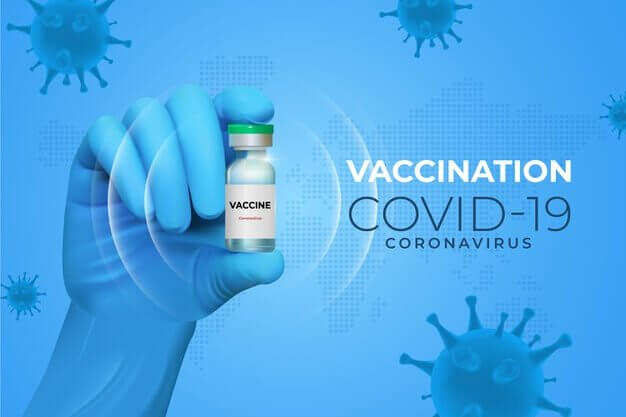
Right now, COVID-19 vaccines are being rolled out right across the UK, with huge numbers being delivered in England especially.
At the time of writing this blog post, over 12 million of those who are most vulnerable to the COVID-19 disease have had their first dose of the vaccine. And at the current rate, 15.9 million people are estimated to have received the first dose of the vaccine by the middle of February, exceeding the government’s target of 15 million.
How good this news is can’t be understated—it truly seems to be that it’s our ticket out of COVID-19 lockdown restrictions. However, we shouldn’t get complacent; it’s still as important as it ever has been to keep our hands clean, wear our masks, and keep our distance.
In this blog post, we’re going to answer some of the most common questions about the COVID-19 vaccines and Healgen antigen test based on information that has been provided by the government.
Very, very important.
Effective vaccination is a vital part of ending the COVID-19 pandemic. By vaccinating the population, it’s possible to stop those who are most at risk from getting the virus. This means a reduction in the number of people in hospital, less pressure on the NHS, and fewer deaths.
That’s exactly why the government has prioritized and sorted those who are must at-risk into “priority cohorts” so that they can get the vaccine first (in order 1-9):
By mid-February, the government aims to have vaccinated everybody in groups 1-4 (15 million people).
Once these people have been vaccinated, there’s a much lower risk of the NHS being overwhelmed by COVID-19-related hospitalisations. This will enable the re-opening of the country in stages as the threat the virus poses is mitigated.
According to the government, however, the vaccine won’t stop the pandemic immediately.
It will take time for the vaccine to take hold, and in the meantime, we must continue to socially distance, wash our hands, wear our masks, and follow government guidelines.
Once all priority groups have been offered the vaccine, vaccination will open up to the rest of the adult population. There are no plans to vaccinate anyone under the age of 18 unless they fall into the category of clinically extremely vulnerable.
You will be contacted by the NHS when you become eligible for a vaccine. This will usually be by post. You should not contact your GP to arrange your vaccine**. You should wait to be contacted. It’s also not possible to acquire the vaccine privately by paying for it.
**If you live in England and you are 70+, however, you can now contact the NHS to arrange a vaccine if you have not already been contacted.
You can arrange your vaccine through the national booking service online at NHS.uk, or by calling 119 or speaking to your local GP practice.
If you’re in Scotland, Wales, or Northern Ireland, you should wait to be contacted.
You will be offered a vaccine which has been approved by the Medicines and Healthcare Products Regulatory Agency (MHRA) as safe and effective for your age group, as recommended by the Joint Committee on Vaccination and Immunisation (JCVI).
It’s not possible for you to choose the “type” of vaccine that you are given. This is decided for you. This is because of the logistics involved in the programme to ensure that the most vulnerable are vaccinated in a phased approach.
There are a few individuals who cannot receive a COVID-19 vaccine. These include:
COVID-19 vaccines work much like many others, such as the flu vaccine.
Vaccines contain a weakened or dead version of the virus, or an important part of it (such as a “spike protein”), that triggers an immune response. This dead or weakened version of the virus cannot harm the recipient, but it can trigger this all-important response.
When the vaccine enters our body, our immune system detects the virus and gets to work to produce antibodies, much like it would if we were infected by the live virus. These antibodies stay with us, so if we’re exposed to the virus again in the future, our bodies can quickly fight it off before it causes us to become ill.
This is the big question that’s on everyone’s mind: Are the vaccines safe and how does the government make sure they are?
The official answer is that any vaccine that has been approved for use in the UK goes through a rigorous testing process. This makes sure that the vaccine meets the UK’s high standards of safety, quality, and, most importantly, efficacy (i.e., how effective it is at protecting the recipient.)
Like all medicines, vaccines are strictly regulated and there are checks done at every stage of the process to make sure that safety is never compromised.
Once a vaccine has gone through the initial development phases, a small group of volunteers are given it as part of a clinical trial. This trial is carried out to assess the vaccine’s initial safety.
After the initial trial is done, further trials are done where bigger groups of people get the vaccine. This enables us to learn more about the vaccine’s safety and to see if it triggers a response from the immune system.
Final phases of vaccine trials involve thousands of people so that accurate reports on safety and efficacy can be produced. The Pfizer/BioNtech vaccine which is currently being administered in the UK was given to over 43,000 people during its clinical trial. No major side effects or safety concerns were reported.
The government recently announced that it had decided to triple the time from first to second dose from 4 weeks to 12 weeks.
According to the government, however, this is because we now know more about the vaccines than we did when the 4-week window was first set.
Both the Pfizer/BioNtech and the Oxford/AstraZeneca vaccines provide high levels of efficacy (protection) after the first dose. By delaying the time to the second dose, the government can administer more first doses of the vaccine and protect more vulnerable people, more quickly.
The government has assured us that COVID-19 variants are unlikely to pose a significant risk to the vaccination efforts. This cannot be guaranteed, however.
We are continuing to advance our understanding of the effect that variants have on vaccine efficacy by the day. At present, there’s no evidence that suggests that a variant will make the vaccines ineffective.
According to the government, the vaccines that are currently being used offer at least 50% protection against the South Africa variant. This is equivalent to the flu vaccine.
There are several studies taking place right now, including a trial of AstraZeneca in South Africa, that will further our understanding of how variants change the state of play.
Due to our lack of understanding, in addition to other factors, it’s important to continue following guidelines: social distance, wear masks, and stay at home whenever possible.
Yes, the government has made this clear: You must continue to follow all the same guidelines after you have been vaccinated.
The reason for this is because the information that we have on vaccines so far suggests that they’re highly effective, not that they’re 100% effective. This means that there’s still every possibility that somebody who has been vaccinated could still get infected with COVID-19 (albeit with much less severe effects) and pass it on.
This also means that if you come into contact with someone who has the virus, or if someone in your household has it, you must self-isolate as normal.
Emir Limam – E11 Group B.V. Netherlands – Fraudster
24 May 2023When to Take a Test After Covid Exposure?
30 January 2023A Rapid Antigen Test vs a Lateral Flow Test for Covid-19
30 January 2023